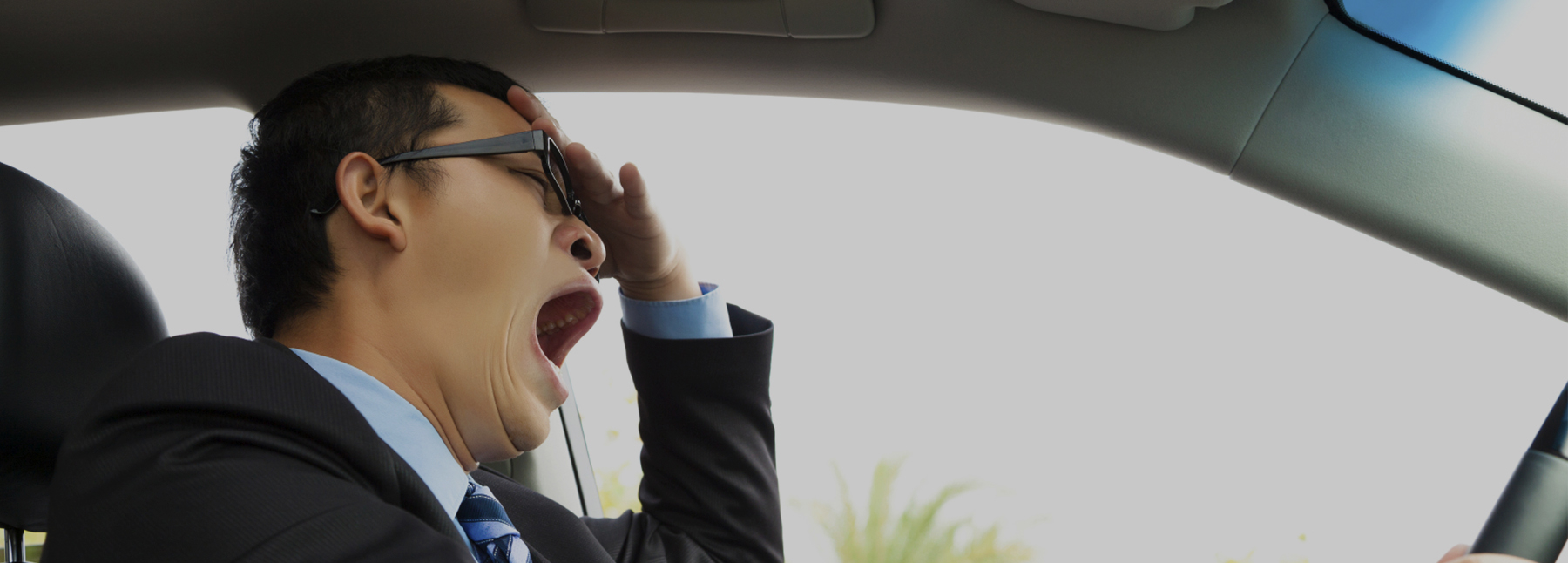Almost half of male drivers admit to experiencing micro-sleeps at the wheel. To learn more about the dangers of drowsy driving, Allianz talked to two sleep experts.
A survey by road safety charity Brake, found that 45% of men and 22% of women admitted to micro-sleeping while driving. Nodding off for even a fraction of a second is enough to cause a fatal crash.
To find out more about micro-sleeps, Allianz interviewed Dr. Jörg Kubitzki (an accident researcher at the Allianz Center for Technology, where part of his work involves investigating the impact that road users’ behavior and mental state have on accidents) and Dr. Roland Popp (a psychologist at the University Medical Sleep Center in Regensburg-Donaustauf).
Mr. Popp, Mr. Kubitzki, so what exactly is “micro-sleep”?
Mr. Popp: We sleep specialists talk about so-called micro-sleep episodes, which we monitor in our sleep laboratory. The episodes can be very brief, but may also last for 10 to 15 seconds or even longer. And it's not always necessarily the case that your eyes are closed. The condition of sleepiness or fatigue is different for every person.
Mr. Kubitzki: The term micro-sleep suggests to some: "Oh well, the danger doesn't last long." However, at a certain level of fatigue you're simply no longer capable of completely concentrating on the task of driving. And if you should nod off for one or two seconds, the minutes before and after – actually, the whole trip, in fact – are also dangerous.
I must confess that I always have a can of energy drink in my glove box. Does it help?
Mr. Kubitzki: If you ask yourself during a journey what you can do when you get tired, I must honestly say that something has already gone wrong beforehand. This also applies if you rely on technical systems; these are at best emergency solutions.
Mr. Popp: The best cure for tiredness is in fact sleep – but please not behind the steering wheel, use a rest area instead! A “turbo sleep”, as the Swiss call it, lasting for 20 or 30 minutes really helps. But it shouldn't go longer, otherwise your circulatory system will slow down, bringing you into deeper states of sleep. If you drink one or two coffees before your nap, this will even increase the caffeine's effect, as it takes 20 or 30 minutes for it to be absorbed in the bloodstream.
Turning up the radio, rolling down the window...
Mr. Popp: Neither works, as investigations in driving simulators and on the road have shown. On the contrary: If you subjectively feel more awake when there's loud music or cooler air –which objectively is not true – then you're underestimating the degree of your tiredness as well.
Auto manufacturers are offering warning or correction devices against micro-sleep. Do they help?
Mr. Kubitzki: It's a contradiction in terms if I expect a vehicle to reliably warn me against driving a vehicle! No system is able to predict the moment you actually fall asleep. It's possible to recognize typical change patterns via certain parameters such as steering behavior or track measurements, and on this basis send out warning signals to the driver. And this is something that the various “driver drowsiness detection systems” of auto manufacturers are already doing.
But we lack the appropriate data to be able tell how whether all these systems are really capable of reducing the number of accidents caused by tiredness. And for as long as these data are missing, the assistance systems such as the lane departure or distance warning system, the emergency braking system and others, are merely a pragmatic approach. But let me say it again: when it comes to errors caused by tiredness, they are at best emergency solutions!
Mr. Popp: The driver drowsiness systems are based on global fatigue indicators. But there are major differences from driver to driver. The effect that fatigue has on driver behavior, eyelid closure, etc. diverges too much for us to be able to come to generally valid conclusions.
When I drive home again after our discussion, what percentage of fellow road users will really be wide awake?
Mr. Popp: Naturally it depends on how much sleep people got throughout the whole week. Additional sleep pressure builds up at the end of the week. You can witness this very well in the underground in Japan, for example.
Mr. Kubitzki: For many decades now, accidents have been peaking twice a day: first when people drive to work, and then again when they drive home after work. When we finish work and drive home after this discussion, the probability of having an accident is higher. However, if we wait in the cafeteria until 7.00 pm, peak hour traffic will have eased off and the accident risk will be lower.
But let's be frank: as respected men in this field, what personal suggestions do you have to prevent micro-sleep?
Mr. Kubitzki: Luckily I've never been in the situation of having to make really long car journeys or feeling that I'm no longer capable of driving. But I'd rather take too many breaks than too few, even if I think I don't need them.
Mr. Popp: My personal tactic for if it turns out to be a longer drive and it’s getting late: take a short nap in between and drink some green tea out of a thermos.
This interview originally appeared in
1890, the customer magazine of Allianz Germany (in German language only).


